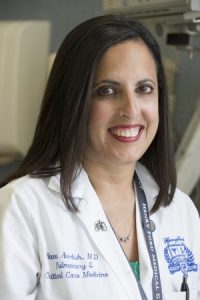
Award Recipient, Finalist Profile 2017
Dr. Rana Awdish, a pulmonary and critical care physician at Henry Ford Hospital in Detroit, Michigan, discovered the significance and power of compassion and communication in care when she was faced with her own healthcare crisis. Seven months pregnant, she was diagnosed with an occult adenoma in her liver. Suffering through this harrowing and life-threatening ordeal, Dr. Awdish lost her entire blood volume into her abdomen, experienced organ failure, was put on a ventilator, suffered a stroke, and miscarried. Due to the incredible work of her caregivers and colleagues, she survived.
Her approach to medicine, however, was forever changed. “The fixed notions I had regarding my purpose as a physician did not survive,” she says. This ordeal provided her with a complex and deep look into how significant communication and compassion are to providing good care. “It took years of being a patient to understand that though the healing potential of knowledge is magical, it is also a lie,” she says, “Medicine cannot function in a vacuum. It requires connection.” She saw firsthand that while patients need high-quality medical treatment, caregivers often unintentionally neglect their emotional needs and desire for human connection.
With her own patients, Dr. Awdish listens genuinely and actively, and makes comforting contact, whether holding a hand or offering a hug. A patient with a long-term illness says of Dr. Awdish, “I have seen many, many doctors in my 60 years with this disease but NEVER have I met a doctor so genuine, so caring and so determined to help me. Dr. Awdish didn’t just care about my condition, she cared about me as an individual. She let me talk without interruption as I shared my fears and anxieties, she hugged me as I cried, and she spoke comforting words to reassure me.”
“Dr. Awdish didn’t just care about my condition, she cared about me as an individual. She let me talk without interruption as I shared my fears and anxieties, she hugged me as I cried and she spoke comforting words to reassure me.”</p.
Having been a patient, Dr. Awdish understands how frightening and vulnerable they can feel. “As a patient, it’s upending to be confronted with the actual fragility of everything you once believed to be a constant. To inhabit that vulnerable space, and to have no one around you who is open to discussion of the devastation, is patently surreal,” says Dr. Awdish. She works with her patients to calm their fears as much as possible. One patient says, “When I come for my check-ups, she is never rushed; she listens patiently to my concerns, provides clear, concise answers, and can always make me feel hopeful, less anxious and extremely blessed to be in her care.” A colleague sums it up nicely as she says, “Her patients truly believe she is their guardian angel.”
Dr. Awdish has parlayed her experiences as both a patient and a caregiver into a memoir, IN SHOCK: My Journey from Death to Recovery and the Redemptive Power of Hope (released in October 2017), and a bold new initiative, the CLEAR Conversations Project. Along with two palliative care physicians, she was one of the pioneers of this program for all staff at her hospital to receive communication and empathy training, supplying healthcare providers with the tools they need to better serve their patients. The program provides caregivers with small group experiential learning opportunities and focuses primarily on addressing the emotions of patients and patient families as well as helping the caregivers craft plans for shared decision-making in difficult circumstances.
While communication initiatives are often viewed as being beneficial to the patient or family member, it has also proved valuable for the caregivers. Caregivers without communication skills training can suffer from increased stress and anxiety. By improving providers’ communication, Dr. Awdish has increased engagement and resilience among her colleagues. The program has grown from a one-department program to a system-wide initiative. One colleague notes, “The growth in both the program and the amount of physicians it reaches in a few short years has influenced the lives of an exponentially increasing number of patients, and could have only been possible through the determination that burns within Rana to improve the patient experience.”
“The medicine I had venerated for so long was only one small, albeit critical, component of my healing,” Dr. Awdish says, “What healed me were providers who were willing to partner with me, understand my patient story, and sit with me through the times of utter darkness. It’s a superlative kind of care, one that translates for the patient what they are experiencing into digestible pieces, and assures them they are not alone–that the path will be forged together. We will use the spark of our medical knowledge to light the way, but the way will be forged together.”
© 2025 The Schwartz Center. All Rights Reserved.